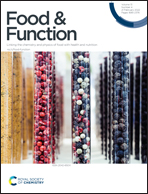Leucine supplementation during late gestation globally alters placental metabolism and nutrient transport via modulation of the PI3K/AKT/mTOR signaling pathway in sows†
Abstract
In a previously published study we reported that sow dietary leucine supplementation during late pregnancy significantly improved newborn piglet birth weight by stimulating protein synthesis in the longissimus dorsi muscle. However, there is still limited knowledge as to whether leucine can exert its effects on the placenta, one of the most important temporal organs during pregnancy, to promote maternal-fetal nutrient supply and thus contribute to fetal intrauterine development. Therefore, we tested this hypothesis in the present study. In total, 150 sows at day 90 of gestation were divided into three groups and fed with either a control diet (CON), CON + 0.4% Leu or CON + 0.8% Leu, respectively, until parturition. Placental metabolomics, full spectrum amino acids and nutrient transporters were systematically analyzed after sample collection. The results indicated that Leu supplementation led to an altered placental metabolism with an increased number of metabolites related to glycolysis and the oxidation of fatty acids, as well as elevated levels of amino acid accumulation in the placenta. In addition, nutrient transporters of amino acids, glucose and fatty acids in the placenta were globally up-regulated and several enzymes related to energy metabolism, including hexokinase, succinate dehydrogenase, lactated hydrogenase, glycogen phosphorylase and hydroxyacyl-CoA-dehydrogenase, were also significantly increased with no change observed in the antioxidative status of those groups with Leu supplementation. Furthermore, the phosphorylation of PI3K, Akt, and mTOR was enhanced in the placenta of sows undergoing Leu treatment. Collectively, we concluded that supplementing the diets of sows with Leu during late gestation globally altered placental metabolism and promoted maternal-fetus nutrient transport (amino acids, glucose, and fatty acids) via modulation of the PI3K/Akt/mTOR signaling pathway.



 Please wait while we load your content...
Please wait while we load your content...